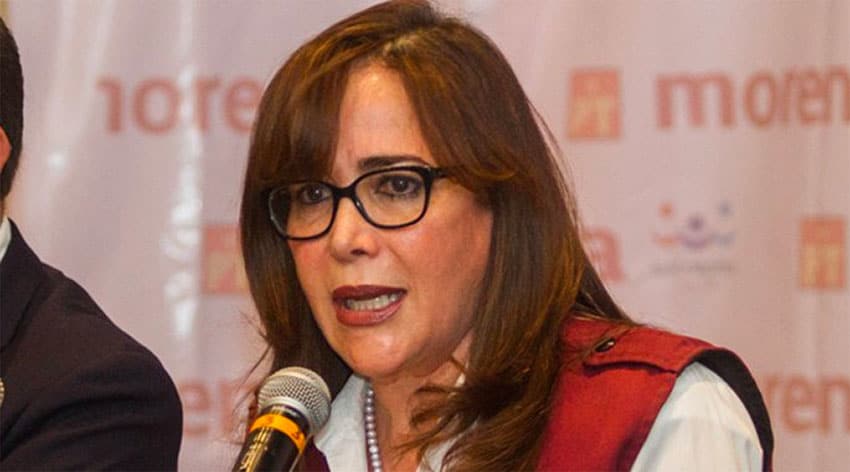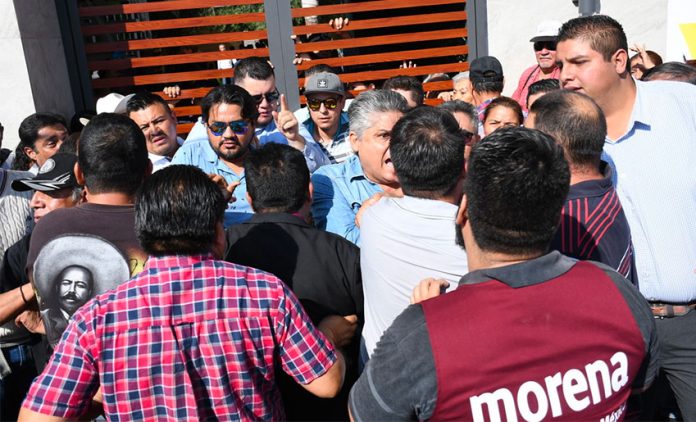Voting to elect delegates who will choose a new national leader of Mexico’s ruling party has been marred by violence for a second consecutive weekend.
Meetings of Morena party members in 17 districts in Hidalgo, Colima and México state were suspended on Sunday due to acts of violence.
In Huejutla, Hidalgo, a man who was demanding to be let into a meeting at which party members were voting fired a gunshot into the air before fleeing. He was later arrested. In Manzanillo, Colima, a man tried to steal a box of ballot papers, triggering a brawl between party members.
Meetings of 15 México state districts, including Ecatepec, Zumpango, Chalco, Nezahualcóyotl, Los Reyes and Coacalco, were canceled due to violence or the threat of it.
Party members came to blows in Nezahualcóyotl while armed persons were seen outside the meeting location in Coacalco, the newspaper La Jornada reported.
The violence in the three states came a week after similar incidents at Morena party meetings in Guerrero, Tlaxcala and Mexico City.
Four candidates are vying for the national leadership of Morena, a party founded by President López Obrador.
Incumbent Morena president Yeidckol Polevnsky is seeking re-election but faces challenges from the party’s leader in the lower house of Congress, Mario Delgado, former Morena National Council president Bertha Luján and Alejandro Rojas, a former secretary of tourism in Mexico City.
Polevnsky said last week that there were irregularities with the Morena party membership list and that the culling of names was necessary to ensure that only true members vote in the district ballots.
She said on Wednesday that those ballots would be suspended until the registry was reviewed but the party’s Honesty and Justice Commission said hours later that wasn’t the case. Polevnsky also claimed that one of her fellow candidates for the national presidency of the party was responsible for the irregularities and violence but didn’t disclose who.
All four candidates have criticized the irregularities and violence in local Morena party meetings.

Martha Singer, a professor of political science at the National Autonomous University, told the news agency EFE that the situation within the five-year-old party is “very complicated.”
“It’s a party with very little institutionalization and that has generated a lot of tension and even aggression within it,” she said.
The tension has been further heightened by the competition for the Morena party leadership.
Singer highlighted that whoever wins the November election will play a key role in determining the candidates for the 2021 mid-term elections and those for state governors.
The national leader will also have the capacity to influence the selection of the party’s candidate for the 2024 presidential election, she said.
Foreign Secretary Marcelo Ebrard, Mexico City Mayor Claudia Sheinbaum and Morena’s leader in the Senate, Ricardo Monreal, have been touted as potential presidential candidates.
The rise of Morena has been meteoric. Apart from providing the president, the party leads a coalition with majorities in both houses of federal Congress and is also in power in Mexico City and several states.
“It’s a party with a lot of political power but with a lot of institutional weakness at the same time,” Singer said.
She contended that López Obrador’s decision to distance himself from Morena since he was sworn in as president last December in an attempt to avoid being tarnished by its internal politics has left the party without moral leadership and triggered a “power struggle” between competing factions.
The president claimed last week that he knew little about the problems in the party.
“They hardly . . . inform me about what’s happening in Morena. But when someone wants to address the issue, I immediately say that it’s nothing to do with me, that I don’t care, I’m not interested,” López Obrador said.
Source: El Financiero (sp), La Jornada (sp), El Sol de México (sp), EFE (sp)
